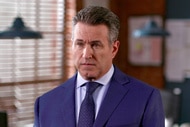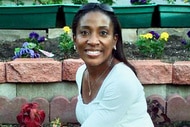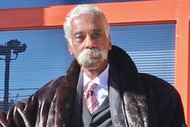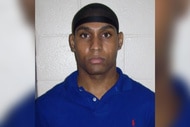Create a free profile to get unlimited access to exclusive videos, breaking news, sweepstakes, and more!
The Brutal Killing That Rocked Debra Newell's Family Decades Before 'Dirty John' Entered The Picture
Cindi Vickers was shot in the back of the head and killed by her estranged husband, Billy Vickers, on March 8, 1984 — a shocking tragedy that could help explain Debra Newell's relationship with "Dirty John."

John "Dirty John" Meehan's deadly encounter with the Newell family sadly wasn't the family's first brush with violence.
More than 30 years earlier, the family's joy was marred by a shocking act of brutality that claimed the life of Debra Newell's sister, Cindi Vickers.
On March 8, 1984, Cindi's husband, Billy Vickers, came up behind her in the kitchen they had once shared together, placed a pistol to the back of her neck, and shot her to death. The two had recently separated at the time.
After pulling the trigger, Billy shot himself in the stomach and then called 911, reportedly telling the dispatchers, "I shot myself," according to the Los Angeles Times.
Although Billy would survive his gunshot wound, his wife would not.
Cindi left behind two young sons, but it was the family's response to the crime that would create a culture of forgiveness and understanding that may have shaped Debra's ultimate desire to look past her new partner's obvious faults.
Cindi got engaged to Billy, a supermarket manager, when she was just 17 and married him after she turned 18. The pair had two children and were seemingly happy, according to Cindi’s mom, Arlane Hart, until one day when Cindi came to her and told her she no longer wanted to be in the marriage.
"She said, 'Mom, I am not happily married. You were right, I should have waited longer. He's not the type of person I want to be married to,'" Hart said in the Dirty John podcast by Los Angeles Times reporter Christopher Goffard.
Hart was surprised by the confession because she had always believed the pair had been so happy at family gatherings, but Cindi went on to tell her mother that Billy had become very possessive. For example, Cindi said, he wouldn't allow her to wear a bikini to the beach or go out on her own at night.
"We just had a great family unit and she named several things that I didn't even know that were happening," Hart said on the podcast.
The divide between Cindi and Billy grew after Cindi met a professional football player and was flattered by the attention he gave her, according to the Los Angeles Times.
She asked Billy for a divorce and the pair sold their house.
Cindi had been planning to have lunch over at her mother's house the day she was killed, but when no one came, Hart put the lunch supplies away and went back to teaching piano lessons.
At 4 p.m., the doorbell rang and Hart opened the door to find two policeman, one of whom told her there had been a shooting. At first, she thought Billy had been so upset he shot himself, she recalled in the podcast, but she then learned that her daughter had been the one who died that day.
"I could not believe what I was hearing," she said. "The two policeman just stood there, with their hats on their chests."
Billy had shot Cindi as she was sitting at a table writing out checks at the home they'd just sold, the podcast reports.
Hart said she immediately started to pray, telling God, "You've got to help me, I cannot do this alone."
She had to tell the news to her grandson, Shad, who was 11 and had been at her house watching television at the time.
But it was Hart's reliance on her lifelong Christian faith that she would later say allowed her to forgive Billy and eventually testify on his behalf during her own daughter's murder trial, a move that stunned the case's prosecutor at the time.
"They threw her under the bus," prosecutor Thomas Avdeef later said, according to the LA Times. "I don't know the dynamics of the family. I could never understand that. Why say bad things about the victim?"
During the trial, Avdeef argued that Billy was a jealous and moody man. He described him as jealous of his wife's good looks and upset when she would ridicule him for his appearance and baldness in front of others they knew, a Los Angeles Times article written at the time says.
Hart took the stand for five hours in Billy's murder trial she recalled in the Dirty John podcast, but even after the prosecutor's repeated questioning, she was steadfast in her support of her onetime son-in-law, who had apologized to her for killing her daughter.
"I loved Billy. I didn't love him for what he did. I hated what he did, but I still loved Billy," she said in the podcast.
His defense team also made the argument that the killing had been committed in a state of temporary unconsciousness, the LA Times reports.
Billy was acquitted by the jury on the murder charge, but they couldn't reach an unanimous decision about whether to convict him of lesser charges and deadlocked in a 7-5 decision, the paper reported at the time.
Before the case was retried, Billy pleaded guilty to voluntary manslaughter and was given a five-year sentence. He'd serve only two years and nine months in jail for shooting his wife to death.
Oxygen.com has reached out to Vickers’ attorney as well as made attempts to contact Vickers. As of publication, neither has responded to a request for comment.
Newell said in the podcast that she was never able to achieve the level of forgiveness for Billy, who later remarried, that her mother had shown. When she'd see him at family events or her nephew's sporting events, she'd say hello but didn't like to be around him.
Still, she grew up in a home where her parents taught her that everyone had value and that through love great things could be achieved. The concept of forgiveness — even for the worst crimes — was hammered into her. Perhaps that was one of the reasons she was so willing to let John Meehan remain a part of her life, even as his deceptive past was coming to light.
"I'll never understand it," Debra Newell said of her own willingness to forgive John Meehan for his lies and deceit in the podcast. "But, I always do see the great in, I think, everyone."
[Photo: California Department of Corrections and Rehabilitation]

























